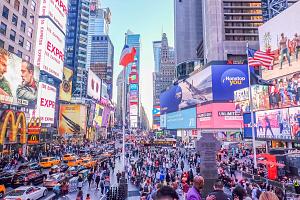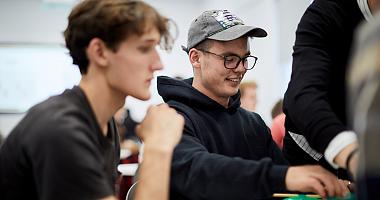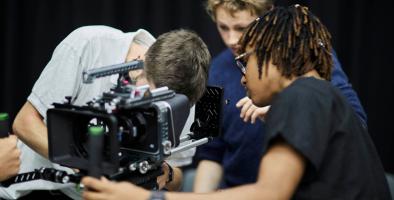BA (Hons)
Media & English
This degree allows you to explore critical perspectives in literature and media alongside each other while developing your skills in creative writing (script and short story) and editing.
Content navigation menu
Why study BA Media & English at Goldsmiths
- The media shapes our lives in many unseen ways, from our views on race and religion to the way we see the economy. You’ll be given the tools you need to understand and address these issues. We encourage you to be critical – a vital skill for questioning the status quo.
- You’ll develop a vocabulary for discussing and analysing works of literature from different genres and historical periods.
- This course offers you the chance to cultivate your creative skills – you’ll be creating screenplays for film and TV, plays for radio, and short stories.
- You’ll gain an understanding of media production and how writing impacts on the technical aspects of the media industry.
- On graduating, you'll have the skills and portfolio to explore careers in writing and production across areas like film, TV, publishing, journalism and advertising.
- We regularly host events in which major international researchers, writers and critics present and talk about their work – they have included director and producer Danny Boyle; director Gurinder Chadha; actor, comedian and writer Sir Lenny Henry; best-selling author Andrea Portes; award-winning Taiwanese-American director, writer and producer Bertha Bay-Sa Pan; film and TV director Mike Newell; and acclaimed UK screenwriter Helen Black.
Contact the department
If you have specific questions about the degree, contact Philip Palmer.
UCAS code
PQ33
Entry requirements
A-level: BBB
BTEC: DDM
IB: 33 points overall with Three HL subjects at 655
Length
3 years full-time
Departments
Media, Communications and Cultural Studies
English and Creative Writing
What you'll study
Year 1 (credit level 4)
You'll take introductory-level theoretical modules in media/communications and literature this year. You'll also take a creative writing module in which you'll explore the various forms of narrative fiction in media – screenplays for film and television, plays for radio and short stories – and develop an original idea into one of these forms.
All modules in your first year are compulsory:
| Module title | Credits |
|---|---|
| Approaches to Text | 30 credits |
| Film and the Audiovisual: Theory and Analysis | 15 credits |
| Key Debates in Media Studies | 15 credits |
| Explorations in Literature | 30 credits |
| Creative Writing (Script and Short Story) Introduction | 30 credits |
Note about optional modules (if available): The above is indicative of the typical modules offered, but is not intended to be construed or relied on as a definitive list of what might be available in any given year. The module content and availability is subject to change.
Teaching style
This programme is taught through scheduled learning - a mixture of lectures, seminars and workshops. You’ll also be expected to undertake a significant amount of independent study. This includes carrying out required and additional reading, preparing topics for discussion, and producing essays or project work.
How you'll be assessed
You’ll be assessed by a variety of methods, depending on your module choices. These may include coursework assignments such as extended essays, reports, presentations, practice-based projects or essays/logs, group projects and reflective essays, as well as seen and unseen written examinations.
Credits and levels of learning
An undergraduate honours degree is made up of 360 credits – 120 at Level 4, 120 at Level 5 and 120 at Level 6. If you are a full-time student, you will usually take Level 4 modules in the first year, Level 5 in the second, and Level 6 modules in your final year.
Careers
What kind of careers and professions might be open to you as a BA Media & English graduate?
- Content creation
- Social media planning and management
- Book and magazine writing and publishing
- Film writing and production
- TV writing and production
- Journalism
- PR
- Teaching
- Advertising
- Civil service
- Business and industry
- European Union private sector management and human resources work
But such is the pace of change you might be pursuing careers we cannot yet imagine… You can read more about possible career options after you graduate on our careers page.
Find out more about employability at Goldsmiths.
Skills
Some of the skills you'll develop during the degree include:
- Critical and analytical thinking
- Communication skills
- Creative writing skills
- Audience understanding
- Proficiency in assessing evidence
- Clear expression of ideas
- Problem solving
- The ability to think creatively
Entry requirements
We accept the following qualifications:
A-level: BBB
BTEC: DDM
International Baccalaureate: 33 points overall with Three HL subjects at 655
Access: Pass with 45 Level 3 credits including 30 Distinctions and a number of merits/passes in subject-specific modules
Scottish qualifications: BBBBC (Higher) or BBC (Advanced Higher)
European Baccalaureate: 75% preferably including English
Irish Leaving Certificate: H2 H2 H2 H2
Additional requirements
A-level English Literature (or Language and Literature) is required; A-level General Studies is not accepted.
As the course demands significant amounts of writing, it's important that you are able to cope with the rigours of the course. You may be asked for examples of written work and called to interview.
Transfers/direct entry
Please note that this programme does not accept transfers/direct entry onto Year 2.
Alternative qualifications and experience
See our full list of undergraduate entry qualifications.
We welcome students with a range of educational experiences. If you believe you may not meet the standard qualification requirements we would still encourage you to apply because we consider all aspects of your application when making a decision.
We’ll pay particularly careful attention to your personal statement, which is your opportunity to demonstrate your interest in the subject you’ve applied for. Your referees are also welcome to include any relevant contextual comments around your academic achievements. We’ll look at all these things when making a decision on your application, as well as your qualifications and grades.
International qualifications
We also accept a wide range of international qualifications. Find out more about the qualifications we accept from around the world.
If English isn’t your first language, you will need an IELTS score (or equivalent English language qualification) of 6.0 with a 6.0 in writing and no element lower than 5.5 to study this programme. If you need assistance with your English language, we offer a range of courses that can help prepare you for degree-level study.
Fees and funding
Annual tuition fees
These are the UG fees for students starting their programme in the 2024/2025 academic year.
From August 2021 EU/EEA/Swiss nationals will no longer be eligible for 'Home' fee status. EU/EEA/Swiss nationals will be classified as 'International' for fee purposes, more information can be found on our fees page.
If your fees are not listed here, please check our undergraduate fees guidance or contact the Fees Office, who can also advise you about how to pay your fees.
It’s not currently possible for international students to study part-time if you require a Student Visa, however this is currently being reviewed and will be confirmed in the new year. Please read our visa guidance in the interim for more information. If you think you might be eligible to study part-time while being on another visa type, please contact our Admissions Team for more information.
If you are looking to pay your fees please see our guide to making a payment.
Funding opportunities
We offer a wide range of scholarships and bursaries, and our Careers Service can also offer advice on finding work during your studies. Find out more about funding your studies with us.
Additional costs
In addition to your tuition fees, you'll be responsible for any additional costs associated with your course, such as buying stationery and paying for photocopying. You can find out more about what you need to budget for on our study costs page.
There may also be specific additional costs associated with your programme. This can include things like paying for field trips or specialist materials for your assignments. Please check the programme specification for more information.






